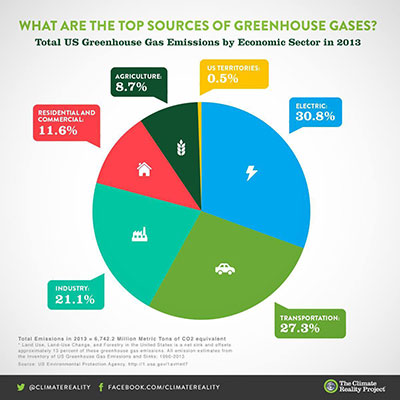Probably the best tagline in the world
Agriculture Causes Less Emissions than Transportation
by Daniel Bailey
(Michigan, United States)
Per the EPA, total GHG contributions from agriculture, which includes all emissions from meat production, represent but 8.7% of the total (with transportation totaling 27.3% and electricity generation totaling 30.8%):
Food systems contribute 19%–29% of global anthropogenic greenhouse gas (GHG) emissions, releasing 9,800–16,900 megatonnes of carbon dioxide equivalent (MtCO2e) in 2008. Agricultural production, including indirect emissions associated with land-cover change, contributes 80%–86% of total food system emissions, with significant regional variation.
Going vegetarian could cut out perhaps 25 per cent of your diet-related emissions.
It is likely that reductions in meat consumption would lead to reductions in dietary GHG emissions.
Per scientist Ken Caldeira, direct emissions from beef is roughly 10 times worse that pork, chicken, etc. (If you include emissions from cutting down forests to raise meat, the ratio could go down to 5).
FYI, the FAO uses an undocumented accounting methodology to support its claims, as compared to those of the EPA, which is documented. As such, the onus is on the FAO to resolve the discrepancies between its claims and those publicly documented by the EPA.
Gavin at RC gives much the same summary in his responses to Geoff Bacon (comment 79) and Joseph O'Sullivan (comment 81), here:
Response: the worldwatch report is the one with the problems. This came up a few years ago when it was published, and the errors involve double counting, including things that are actually carbon neutral, and some large over-estimates of individual terms. But in any attribution excercise, there are many different ways of slicing things and many of the comparisons that are made are down using inconsistent accountings (ie using full life cycle analysis vs not), and so many of the headlines are a little misleading at face value. - Gavin
Regarding deforestation claims, given that the IPCC cites the EPA, here's the EPA numbers:
Land Use, Land-Use Change, and Forestry (17% of 2004 global greenhouse gas emissions) - Greenhouse gas emissions from this sector primarily include carbon dioxide (CO2) emissions from deforestation, land clearing for agriculture, and fires or decay of peat soils. This estimate does not include the CO2 that ecosystems remove from the atmosphere. The amount of CO2 that is removed is subject to large uncertainty, although recent estimates indicate that on a global scale, ecosystems on land remove about twice as much CO2 as is lost by deforestation.
And:
Transportation (13% of 2004 global greenhouse gas emissions) - Greenhouse gas emissions from this sector primarily involve fossil fuels burned for road, rail, air, and marine transportation. Almost all (95%) of the world's transportation energy comes from petroleum-based fuels, largely gasoline and diesel.
So, factoring in regrowth, the land-based ecosystems serve as a net SINK, not a source, of CO2. Curious, the accounting procedures that leave out this inconvenient figure.
Here's even more current data, from the UCUSA (data through 2010/2012):
"The most reasonable current estimate for the percentage of emissions that come from tropical deforestation is 10 percent."
So actually less than transportation. And still not reflecting the uptake (sink) factors due to regrowth mentioned above.
Join in and write your own page! It's easy to do. How? Simply click here to return to Your Pages.
Join the Community and Newsletter (5000 Subscribers)
You can subscribe to my Substack Page or see the archives of previous posts. More great content coming soon!
Recent Articles
-
Climate Presentations by Climate Reality
Mar 03, 24 12:17 AM
You can see great climate presentations by Climate Reality. They can be customized for different audiences. -
Make the Planet Great Again!
Mar 02, 24 11:33 PM
We need to make the planet great again! We will build a solar wall along the Mexican border and make the fossil fuel industry pay for it! -
Historical Climate Change News
Mar 02, 24 11:25 PM
This section includes historical climate change news you should know about. These articles span several different topics and will help you stay up-to-date. -
Hottest Years on Record
Mar 02, 24 11:05 PM
The hottest years on record have all occurred since 1998 which is quite alarming to say the least.




